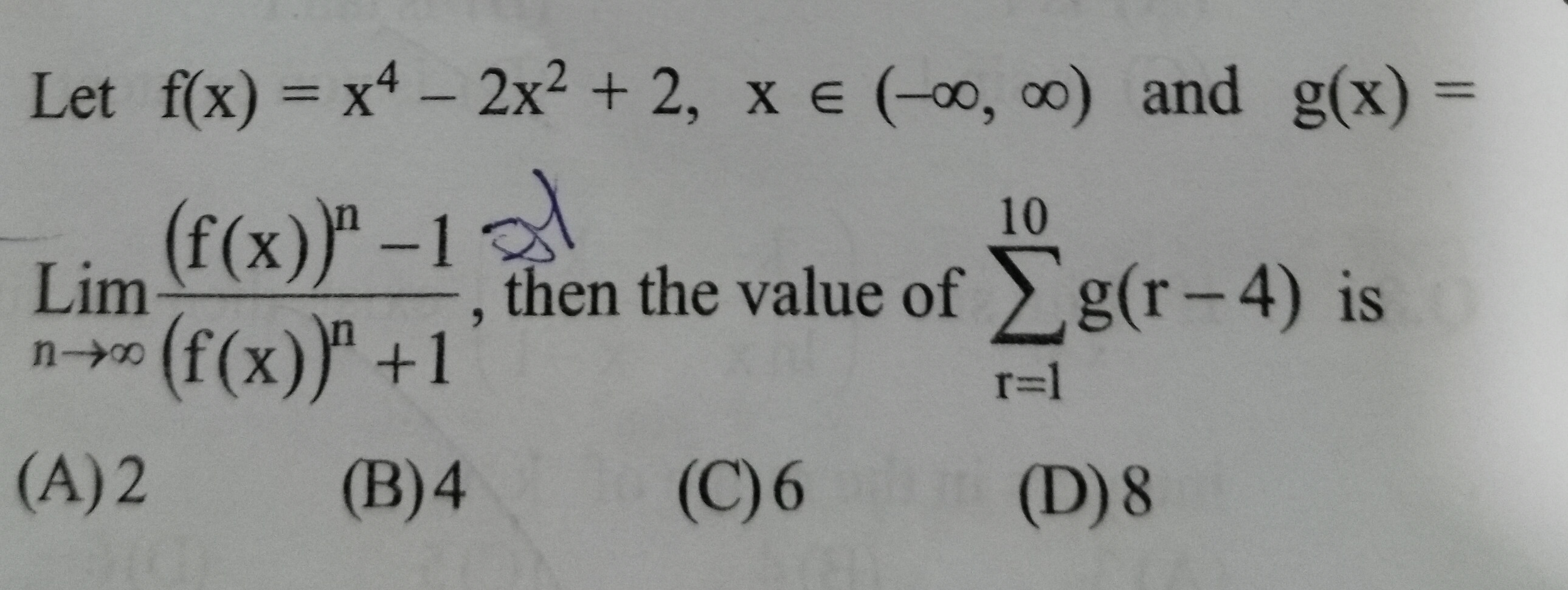Question
Question: Let $f(x) = x^4-2x^2 + 2$, $x \in (-\infty, \infty)$ and $g(x) =$ $$ \operatorname{Lim}_{n \rightarr...
Let f(x)=x4−2x2+2, x∈(−∞,∞) and g(x)=
Limn→∞(f(x))n+1(f(x))n−1, then the value of r=1∑10g(r−4) is
2
4
6
8
8
Solution
Let f(x)=x4−2x2+2. We can rewrite f(x) by completing the square:
f(x)=(x2)2−2(x2)+1+1=(x2−1)2+1.
Since (x2−1)2≥0 for all real x, the minimum value of f(x) is 0+1=1, which occurs when x2−1=0, i.e., x=±1.
For all other values of x, (x2−1)2>0, so f(x)>1.
Thus, f(x)≥1 for all x∈(−∞,∞).
Now consider the function g(x)=Limn→∞(f(x))n+1(f(x))n−1.
Let y=f(x). We need to evaluate Limn→∞yn+1yn−1.
Case 1: y>1. Divide the numerator and denominator by yn:
Limn→∞yn+1yn−1=Limn→∞1+1/yn1−1/yn. Since y>1, Limn→∞1/yn=0.
So, the limit is 1+01−0=1.
Case 2: y=1.
Limn→∞1n+11n−1=1+11−1=20=0.
Since f(x)≥1 for all x, these are the only cases we need to consider for y=f(x).
So, the function g(x) is defined as:
g(x)=1 if f(x)>1
g(x)=0 if f(x)=1
We know that f(x)=1 when x=±1, and f(x)>1 when x=±1.
Therefore, the function g(x) can be written as:
g(x)={01if x=−1 or x=1if x=−1 and x=1
We need to find the value of the sum ∑r=110g(r−4).
The terms in the sum are g(r−4) for r=1,2,…,10.
Let k=r−4. As r goes from 1 to 10, k goes from 1−4=−3 to 10−4=6.
The sum is ∑k=−36g(k).
The arguments of g in the sum are the integers in the set {−3,−2,−1,0,1,2,3,4,5,6}.
We need to evaluate g(k) for each k in this set:
g(−3): −3=±1, so g(−3)=1.
g(−2): −2=±1, so g(−2)=1.
g(−1): −1=−1, so g(−1)=0.
g(0): 0=±1, so g(0)=1.
g(1): 1=1, so g(1)=0.
g(2): 2=±1, so g(2)=1.
g(3): 3=±1, so g(3)=1.
g(4): 4=±1, so g(4)=1.
g(5): 5=±1, so g(5)=1.
g(6): 6=±1, so g(6)=1.
The sum is the sum of these values:
∑r=110g(r−4)=g(−3)+g(−2)+g(−1)+g(0)+g(1)+g(2)+g(3)+g(4)+g(5)+g(6)
=1+1+0+1+0+1+1+1+1+1
There are 10 terms in total.
The terms where g(k)=0 are for k=−1 and k=1. There are 2 such terms.
The terms where g(k)=1 are for the remaining 10−2=8 values of k.
The sum is (8×1)+(2×0)=8+0=8.
